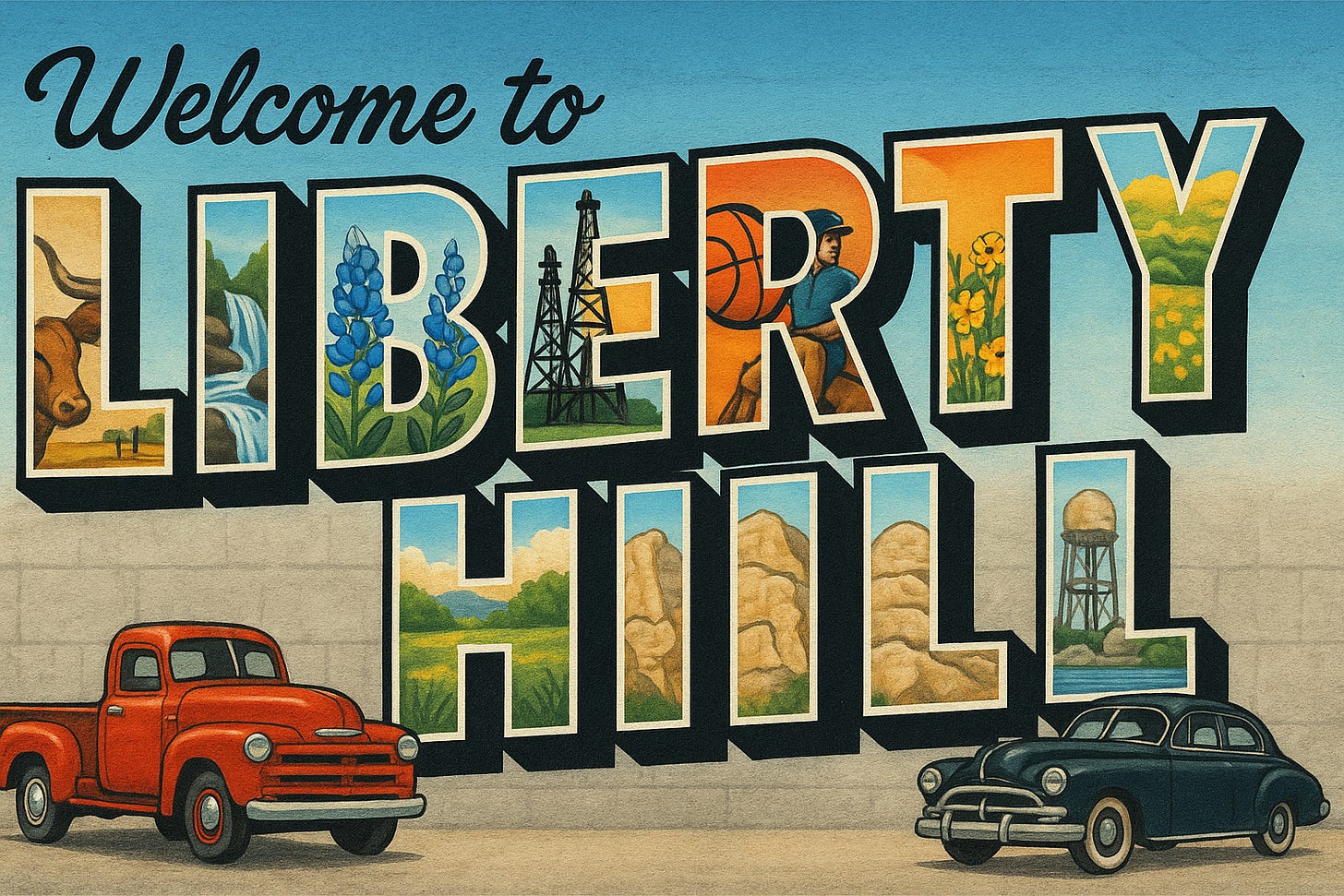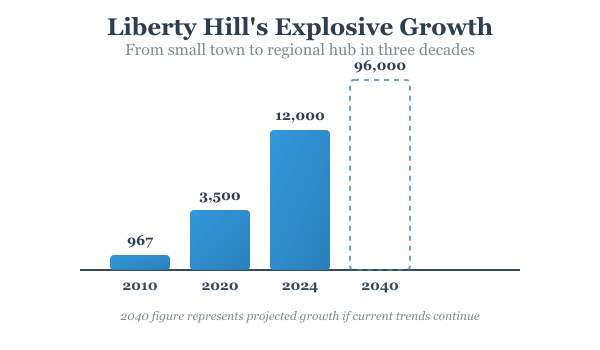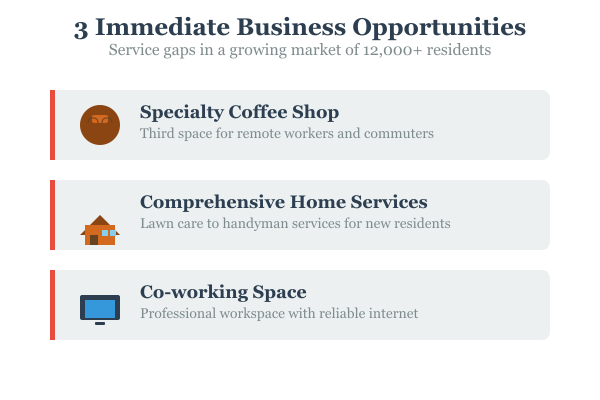Liberty Hill: Small Town, Big Business
904% Growth Since 2013 | ~12,000 Current Residents | $75M Retail Investments
Issue: 02 Street BLUF: Liberty Hill has grown 904% since 2013, expanding from 967 residents to 12,000 today. With $75 million in retail construction underway and projections of 84,000 more residents by 2040, the city presents immediate opportunities for entrepreneurs willing to serve a rapidly growing community that still relies on neighboring cities for everyday services like specialty dining, home services, and professional workspace. Today's profile is brought to you by: 1) Bell Chime Capital - Selling Your Texas Business? Skip the lengthy sales process. Local buyers who understand your market and value what you've built. Get your free business valuation today → Visit BellchimeCapital.com
City Financial Summary
General Fund:
Ended FY2024 with an unassigned fund balance of $15.0M, equivalent to 150% of total expenditures.
Fund balance grew by $588K due to underspending against budget.
Total General Fund revenues: $11.1M, expenditures: $9.6M.
Top Revenue Sources:
Property tax: $5.8M (↑7% YoY).
Sales tax: $4.6M (↑35% YoY).
PID assessments: $2.1M, investment income: $5.0M.
Debt Load:
Total outstanding debt (including premiums): $112.7M, with $4.6M in principal paid during FY2024.
Debt is heavily concentrated in business-type activities (utilities).
Capital Projects:
Major projects include $16.5M in wastewater construction, $2.6M for redrilling wells, and $2.3M for Hwy 29 improvements.
Grants:
Received $5.8M in total grants and impact fees, down from $11.3M the previous year.
Reserves:
Total city net position: $158.9M, of which $49.2M is unrestricted.
Street Assessment:
Liberty Hill is in strong financial shape.
The city has more money in its general budget than it needs, revenues are growing, and they're investing heavily in public projects. They've spent a lot on upgrading water and utility systems, which has used up some cash reserves, but the infrastructure investments are solid long-term moves.
The city could improve by setting clearer policies on how much money to keep in reserve and how much debt to take on, plus keeping tighter control over department spending.
For businesses and developers, Liberty Hill is financially stable and actively investing in the infrastructure you need to succeed.
The Analysis:
Drive through Liberty Hill today and the signs of rapid change are visible everywhere.
What started as a town of 967 people in 2010 has expanded to 12,000 residents. City planners project another 84,000 people by 2040; growth that would make Liberty Hill larger than Georgetown's current population.
Most families here earn $112,000 annually, well above regional averages. Local retail sales reached $64 million in 2020, and with the population doubling since then, spending has continued to climb. While this growth has expanded the city's tax base, it has also revealed the true cost of rapid expansion. Liberty Hill needs $88 million to maintain its current 90 miles of streets over the next 25 years; meaning, $3.5 million annually, or nearly one-third of the city's current budget.
City officials recognize that growth can pay for infrastructure costs, but only with careful planning and the right types of development.
How the City is Managing Growth
Liberty Hill's leaders have chosen to actively direct where and how growth occurs through strategic partnerships and financial incentives. The Liberty Hill Economic Development Corporation (LHEDC) uses sales tax revenue to offer incentives, expedite permits, and create partnerships with developers willing to build according to the city's vision.
The city's approach involves staying ahead of development rather than reacting to it. This means making infrastructure commitments early in the development process to support projects that align with their long-term vision.
The centerpiece of this strategy is Platform 183×29, a 120-acre mixed-use development at the intersection of US 183 and State Highway 29. Though most of the project sits outside current city limits, the city has already committed to extending water and sewer lines to support it. The first phase already includes 48,000 square feet of business space, and when complete, the project will span 1.3 million square feet of industrial space, 325+ residential units, and 175,000 square feet of retail, all developed over seven years.
"Having that development puts Liberty Hill in a very competitive position," says a county economic development official. "It's going to help attract companies sooner rather than later."
Major Retailers Have Taken Notice
This competitive positioning is already paying dividends.
Major national retailers have recognized Liberty Hill's demographic transformation and are making substantial investments in the community. The town's first Costco warehouse, a $75 million investment in 160,000 square feet plus a gas station, is scheduled to open by late 2025. A $22 million Target will follow in summer 2026. These developments mark a shift for a community where residents currently drive to neighboring cities for most shopping needs beyond local groceries and gas.
The retail expansion extends beyond big-box stores. Whataburger invested $2.6 million to open its first Liberty Hill location in 2025, occupying 3,300 square feet on West SH-29. The LHEDC has conducted retail gap studies to identify what other businesses the growing population can support.
The city positions itself as a place that's "open for business" somewhere "where it's easy for businesses to get things done" with "minimal red tape." This approach attracts retailers who see the population growth as an opportunity to establish market presence in a developing area.
Balancing Highway Growth with Downtown Character
While major retailers are establishing themselves along the highways, Liberty Hill's historic downtown requires a different approach entirely.
The city adopted a comprehensive Downtown Master Plan in July 2024 that maps $23 million in investments designed to create two distinct districts: Church Street focused on health and fitness businesses, and Stubblefield Street dedicated to shops and restaurants.
This downtown planning addresses a common tension in rapidly growing communities: how to preserve the character that attracted residents while adding the amenities they now expect.
The LHEDC's purchase of 1.51 acres in the downtown core signals the city's commitment to this balance, with plans for public art installations, specialty lighting, and pedestrian pathways intended to create a walkable district.
The city's emphasis on public art builds on an existing cultural asset, Liberty Hill's International Sculpture Park. The annual sculpture festival already draws visitors from across the region, giving the city an established identity beyond typical suburban development. This cultural foundation supports the city's broader philosophy that recent growth "hasn't changed who we are, a caring and compassionate community where it's easy for businesses to get things done."
The approach underlies the official slogan: "Small Town with a Big Heart."
What the Local Business Environment Offers
This commitment to preserving community character while embracing growth creates a unique business environment in Liberty Hill.
The town maintains its small-town supportive culture, where neighbors know each other and word-of-mouth drives success, while benefiting from a rapidly expanding customer base that has tripled in just a few years.
For entrepreneurs, this translates into immediate market opportunities.
Residents remain dependent on neighboring cities for many everyday needs: specialty retail, family restaurants, coffee shops, home services, and professional services beyond the basics. Local firefighter Ryan Woelfel recognized this gap and started Glitz Premier Lighting as a side business. Similarly, when the owners of historic Winkley's General Store decided to sell, newcomer Dinesh Patel stepped in to preserve this community institution while adapting it for growth.
The supportive climate shows how quickly businesses can establish themselves and expand.
The Yogurt Experience opened a second location within months of launching its first, while new ventures like El Mariachis’ Mexican restaurant and The Iron Plate Gym have found immediate success.
Even longtime businesses are thriving. Pure Remedy Massage Therapy recently celebrated seven years, and Fire Oak Distillery is marking its 10-year anniversary.
This success stems from both growing demand and community support.
The local workforce draws from diverse industries, while the broader region provides access to 1.3 million people within commuting distance. Housing costs remain competitive with neighboring communities, helping businesses recruit talent who value small-town amenities with metropolitan access.
Economic Development Director Christian Kurtz explains that officials are "leveraging all of the tools in the toolbox," including specialized programs and expedited approvals, seeking development that "gives all the citizens an opportunity to be part of that growth" where "nobody gets left behind."
The result is a business environment where entrepreneurs can capitalize on unmet demand while building within a community that actively supports their success, a combination of market opportunity and hometown backing that's increasingly rare as suburban areas grow.
Where Liberty Hill Stands Today and Tomorrow's Opportunities
Liberty Hill is at an inflection point that few communities experience.
The transformation from a town of 967 residents in 2010 to 12,000 today represents more than dramatic population growth; it signals the emergence of a new kind of suburban community that maintains small-town character while offering metropolitan access and opportunity.
The scale of projected growth remains substantial.
Liberty Hill could potentially reach 96,000 residents by 2040 if current trends continue, creating a market eight times larger than today's. This transformation presents immediate opportunities for entrepreneurs willing to serve a community that still relies on neighboring cities for many everyday needs.
Based on Liberty Hill's current needs and growth trajectory, 3 business opportunities stand out:
Specialty coffee shop - to serve professional commuters and remote workers that need a third space beyond home and Austin offices. Currently, limited options available.
Comprehensive home services - New residents need everything from lawn care to house cleaning, handyman services, and home maintenance. Currently, the majority of these services are sourced from neighboring cities.
Co-working space - Remote workers drawn by affordable housing and small-town life need professional workspace with reliable internet and meeting facilities.
For entrepreneurs willing to become part of Liberty Hill's story, the opportunity extends beyond building a business; it's about helping shape what this community becomes over the next 50 years.
Sources -
Next Town: Leander, Texas
Have a great week! See you next Monday,
Omegadson



